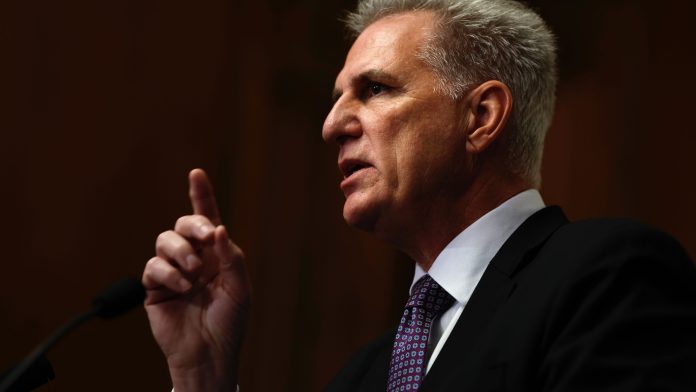For weeks, Speaker Kevin McCarthy seemed to face an impossible choice as he haggled over spending bills with his party’s most hard-line members: He could keep the government open, or he could keep his job. At every turn, McCarthy’s behavior suggested that he favored the latter option. He continued accepting the demands of far-right Republicans to deepen spending cuts and dig in against the Democrats, making a shutdown at tonight’s midnight deadline all but a certainty.
[Read: Why Republicans can’t keep the government open]
With just hours to go, however, the speaker abruptly changed course, defying his conservative tormentors and partnering with Democrats to avert a shutdown. The House this afternoon overwhelmingly approved a temporary extension of federal funding. If the Senate approves the House legislation tonight, as it is expected to, the deal will put off a shutdown for at least 45 days and buy both parties more time to negotiate spending for the next fiscal year.
The question now is whether McCarthy’s pivot will end his nine-month tenure as speaker. By folding—for now—on the shutdown fight, he is effectively daring Representative Matt Gaetz of Florida and other hard-line Republicans to make good on their threats to depose him. “If somebody wants to remove [me] because I want to be the adult in the room, go ahead and try,” McCarthy told reporters before the vote. “But I think this country is too important.”
The stopgap bill includes disaster-relief money sought by both parties, but McCarthy refused to add $6 billion in Ukraine aid that the Biden administration and a bipartisan majority of senators wanted. The Senate had been on the verge of passing its own extension that included the Ukraine money, but after the House vote it was expected to accept McCarthy’s proposal instead. Whether House Republicans agree to include Ukraine assistance in the next major spending bill is unclear, but Democrats and Senate Minority Leader Mitch McConnell are likely to make an aggressive push for it.
McCarthy’s surprising about-face set off a wild few hours in the Capitol. Democrats were caught off guard and stalled for time to read the new bill, unsure if Republicans were trying to sneak conservative policy priorities into the legislation without anyone noticing. (In the end, only a single Democrat voted against it.) Representative Jamaal Bowman of New York, a second-term Democrat, caused the evacuation of an entire House office building when he pulled a fire alarm just before the vote, in what Republicans said was a deliberate—and possibly criminal—effort to delay the proceedings. (Bowman’s chief of staff said that the representative “did not realize he would trigger a building alarm as he was rushing to make an urgent vote. The Congressman regrets any confusion.”)
[Annie Lowrey: How to end government shutdowns, forever]
On the right, the criticism of McCarthy was predictable and immediate. “Should he remain Speaker of the House?” one of his Republican opponents, Representative Andy Biggs of Arizona, tweeted after the vote, seemingly rhetorically. Yet to more moderate Republicans, the speaker’s decision was a long time coming. McCarthy’s months-long kowtowing to the right had frustrated more pragmatic and politically vulnerable House Republicans, a few of whom threatened to join Democratic efforts to avert, or end, a shutdown. But many Republicans are even more furious at Gaetz and his allies. “Why live in fear of these guys? If they want to have the fight, have the fight,” former Representative Charlie Dent of Pennsylvania, a moderate who served in the House with McCarthy for 12 years, told me. “I don’t understand why you would appease people who are doing nothing but trying to hurt and humiliate you.”
This morning, the speaker finally came to the same conclusion. His move to relent on a shutdown only kicks the stalemate over federal spending to another day. Now it’s up to House Republicans to decide if McCarthy gets to stick around to resolve it.

















